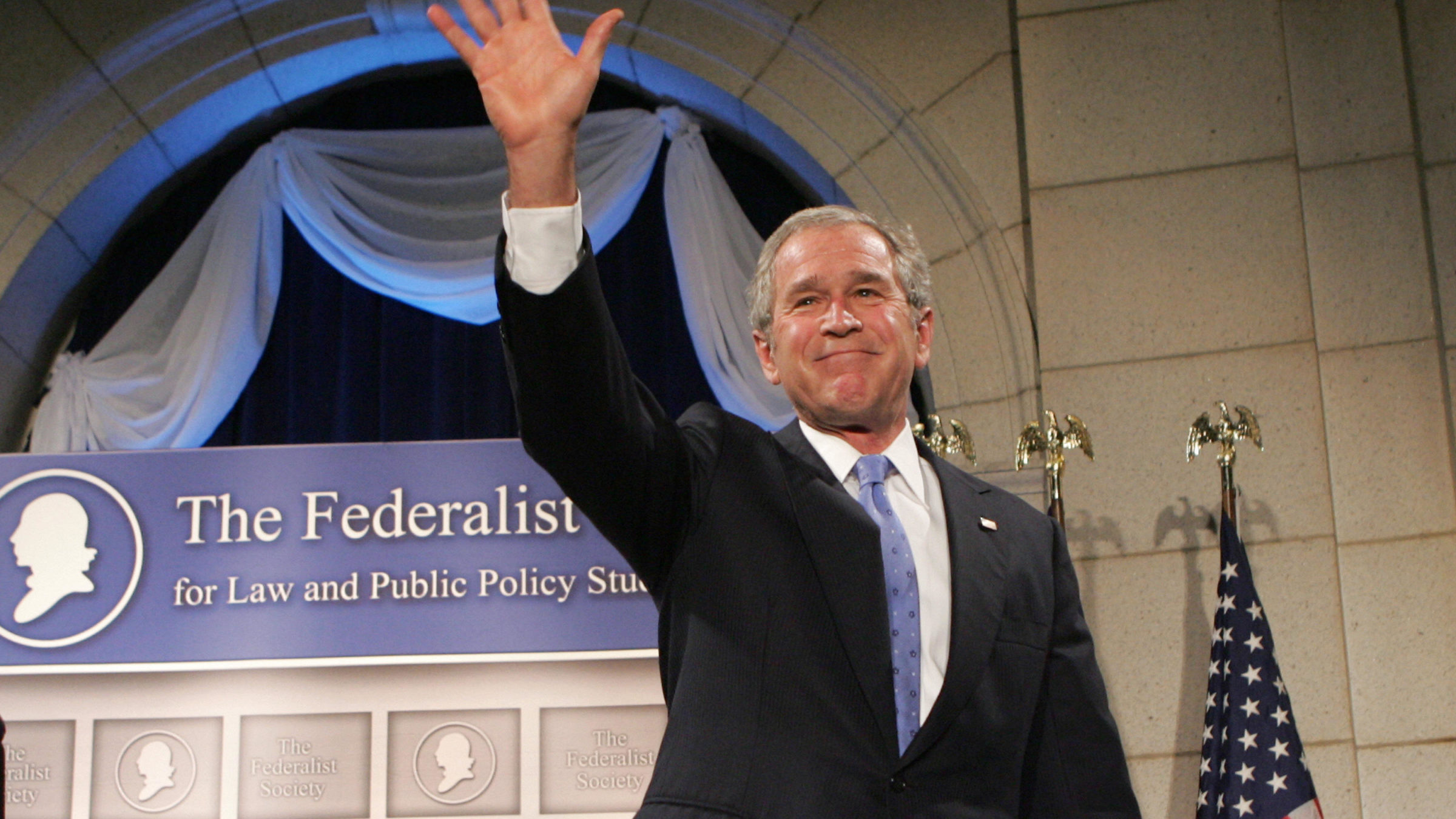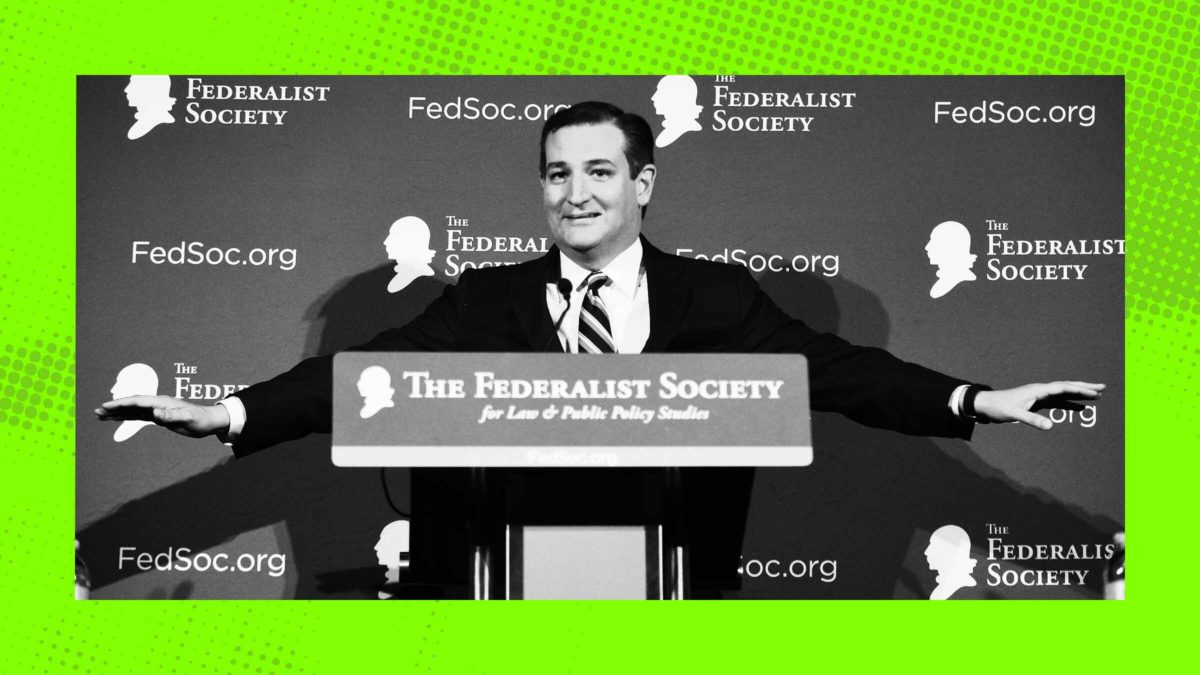This week, the Federalist Society will kick off its annual national convention in Washington, D.C.: a three-day festival of conservative legal movement luminaries explaining that the correct schools of jurisprudential thought are those that yield the conservative legal movement’s preferred policy outcomes. Given the key roles played by Federalist Society affiliates in fomenting the January 6 insurrection, this particular convergence of states’ rights enthusiasts on our nation’s capital will ideally result in fewer violent coup attempts.
The agenda is a laundry list of familiar right-wing grievances overlaid with the thinnest legalistic veneer imaginable: There are panels to discuss the dire threats to the constitutional order posed by Critical Race Theory, defunding police, and (of course) cancel culture. There are appearances by the author of something called Woke Inc: Inside America’s Social Justice Scam. There is a black-tie optional Antonin Scalia Memorial Dinner featuring a keynote address from Arkansas senator and noted fascism enthusiast Tom Cotton. There is a screening of a short film entitled Roe v. Wade: A Legal History, which I assume leans heavily on footage of middle-aged white guys harrumphing about the scourge of liberal judicial overreach.
The mere fact that these events are taking place, however, is less troubling than the ongoing willingness of members of the legal establishment—even self-proclaimed liberals—to enthusiastically participate. As an emboldened conservative legal movement uses its grip on federal judicial power to hollow out civil rights and undermine democracy, a startling number of legal elites seem unable to stop themselves from propping these efforts up.
The Federalist Society, or FedSoc, is a network of conservative lawyers and law students formed in the early 1980s in response to the “orthodox liberal ideology” that ostensibly dominates the legal academy. Today, it sponsors what amounts to a series of glorified law school debate clubs that all serve Chick-fil-a for lunch. The Federalist Society is “about ideas,” per its web site, and aims to foster “fair, serious, and open debate” about the proper role of the legal system.
The other side of the Federalist Society operates largely outside of public view, where it is an integral part of the effort to reshape America in the conservative legal movement’s image. It functions as a feeder system for conservative law students, placing them in prestigious judicial clerkships that propel them to positions of power in Congress, on Wall Street, and in elite universities. Texas Senator Ted Cruz owes his fast-tracked career largely to the connections he made at Harvard Law School’s chapter; a decade later, Missouri Senator Josh Hawley served as president of Yale’s. From Reagan to Bush to Bush to Trump, the throughlines of four decades of Republican politics have been cutting taxes for rich people, demonizing poor and Black people, and installing FedSoc acolytes on the federal bench.

SAUL LOEB/AFP via Getty Images
The organization’s influence reached its apex during the presidency of Donald Trump, who more or less outsourced judicial nominations to the Federalist Society’s Rolodex of loyal foot soldiers. An estimated 85 percent of his appeals court nominees came from FedSoc, as did the three Supreme Court justices he plucked from a list assembled with the generous assistance of FedSoc leadership. (The organization is always careful to note that its employees technically take leaves of absence to work on nominations, which is the kind of embarrassingly hollow explanation that only a group of conservative lawyers could imagine would satisfy anyone.) Now, FedSoc operates as a quasi-independent legal wing of GOP politics, recently making headlines for the efforts of its various affiliates to overturn the results of the 2020 election. Even as you read this sentence, it is grooming a new generation of lib-owning ideologues for the next Republican president with the power to hand them a gavel and life tenure.
The Federalist Society is, in other words, one of the most powerful reactionary forces in the legal universe, which makes the participation of non-reactionaries in its fancy events equal parts baffling and alarming. Victoria Nourse, whom President Barack Obama unsuccessfully nominated to a federal appeals court vacancy, will take part in a panel discussion about limiting the powers of administrative agencies, a perennial white whale for the conservative legal movement. Jonathan Lowy of the Brady Campaign to Prevent Gun Violence will weigh in on a Supreme Court case that this conservative supermajority could use to establish a nationwide right to carry. A breakout group that characterizes the progressive criminal justice reform agenda as “a broader assault on the fundamental American precept of ‘ordered liberty’” includes Philadelphia district attorney Larry Krasner, who ran for office on a platform of reducing incarceration and tackling police misconduct, and Tracey Meares, a Yale Law School professor who served on President Obama’s task force on policing after the killing of Michael Brown in 2014. The trend is by no means limited to this week’s festivities: Perusing any list of Federalist Society events reliably yields the names of left-leaning attorneys who should know better, yet nevertheless agree to show up.
Liberals who accept the self-serving premise of “debate” ignore the clear, overwhelming evidence that the Federalist Society’s agenda inflicts harm on hundreds of millions of vulnerable people.
The heterodox guest of honor is probably Akhil Reed Amar, the self-described “liberal” Yale Law School professor who once wrote a New York Times op-ed lauding the nomination of Justice Brett Kavanaugh as “President Trump’s finest hour, his classiest movie.” Amar, one of the most famous constitutional law scholars in the country, will make multiple appearances at the convention, which sort of makes him the Washington Generals of FedSoc debates: One of his panels will discuss the dangers of Critical Race Theory, and another will examine the conservative justices’ bid to establish a brave new First Amendment era of Christian supremacy. With liberal intellectual champions like these, who needs enemies?
I can understand why smart lawyers might want to try anyway, meticulously workshopping incisive turns of phrase that will convert skeptics into believers on their home turf. But taking seriously the wonky debate club charade misses the point, because the mere presence of token foils at these events legitimizes everything else FedSoc does. Whether they intend it or not, participants are lending their reputations to an embattled institution that depends on influential co-signs from respected outsiders to maintain some semblance of credibility.
Liberals who accept the self-serving premise of “debate” ignore the clear, overwhelming evidence that the Federalist Society’s agenda inflicts harm on hundreds of millions of vulnerable people. You do not have to be a tenured Ivy League law school professor to understand what is going on here. To bite a line from the Federalist Society’s patron saint himself, this wolf comes as a wolf.
This credulous kid-gloves treatment has to stop. If you give a shit about the future of democracy and believe the law should protect anything beyond the free speech rights of kajillionaire Republican donors, FedSoc is simply not the place for you. Participation in the proverbial marketplace of ideas does not require attaching your name to an organization working to undermine the basic principles for which you stand. The Federalist Society has more than enough power in this country already. It doesn’t deserve your help building more of it.

